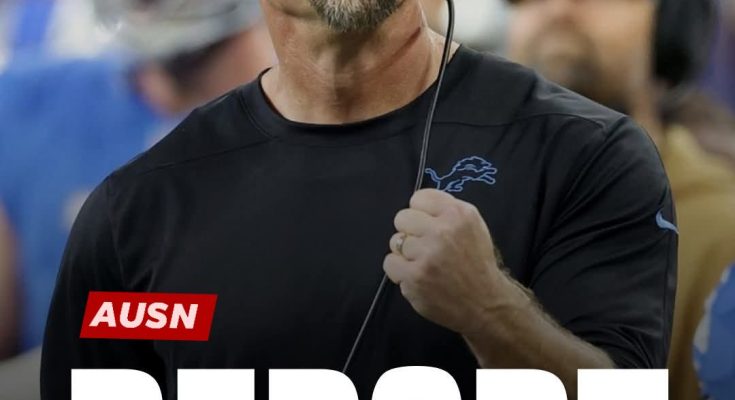Dan Campbell, the head coach of the Detroit Lions, has recently stirred up some significant discussion and controversy regarding the officiating in the NFL, specifically tied to a moment from the Lions’ game against the Kansas City Chiefs. This incident revolves around the opening drive touchdown by Jared Goff that seemingly triggered an immediate league review or intervention from the NFL offices in New York. According to Campbell, there was some ambiguity and confusion about the origin of the decision to overturn or challenge the touchdown, with an official allegedly confirming to Campbell that the call or the directive to review the play “came from New York.” This revelation has sparked interest, debate, and even a bit of skepticism among fans, analysts, and the broader football community about the NFL’s involvement in officiating and how plays are reviewed during games.
The NFL, like many professional sports leagues, has a complex and multilayered officiating system designed to ensure the accuracy and fairness of game decisions. Over the years, the league has increasingly relied on technology and centralized officiating offices to assist on-field referees in making the correct calls. This has included the use of instant replay, coaches’ challenges, and a centralized officiating command center based in New York. The command center reviews plays in real-time, communicates with officials on the field, and has the authority to initiate reviews in specific situations. This system aims to reduce errors and ensure consistency across games, but it also adds a layer of complexity to how decisions are made and communicated.
The incident involving the Lions and Chiefs is an example of this process in action, but it also raises questions about transparency and the influence of the central office on game outcomes. When Campbell asked officials about the source of the call that overturned or affected the touchdown, he was reportedly told that it came from New York, implying that the league’s central office played a direct role in the decision rather than it being purely an on-field judgment. This suggests a scenario where the game is not solely officiated by the referees present at the stadium but is subject to external oversight that can intervene during the flow of the game.
For the Detroit Lions, a team that has been striving to establish itself as a competitive force in the NFL, moments like these are significant. An opening drive touchdown is a critical momentum builder and can set the tone for the entire game. Having that touchdown subject to an external review that leads to an overturn can be disheartening and may affect the team’s confidence and the overall flow of the game. From a coaching perspective, Dan Campbell’s inquiry about the origin of the call shows a desire for clarity and accountability, reflecting the frustration coaches often feel when key plays are altered under circumstances that may seem opaque or unclear.
The involvement of the NFL’s New York officiating office in making or influencing calls is not new, but it is something that teams, fans, and commentators continuously scrutinize. The league has made efforts to improve officiating accuracy, but these efforts can sometimes be perceived as inconsistent or biased, especially when they impact pivotal moments in high-profile games. The perception that an external office has the power to overturn plays based on their own discretion rather than purely the judgment of on-field officials can lead to debates about fairness and the spirit of the game.
Moreover, the transparency of the review process is often a point of contention. While the NFL broadcasts instant replay reviews and explanations to viewers, the internal communications between the command center and on-field officials are not always made public in detail. This lack of full transparency can leave teams and fans guessing about why certain decisions are made and whether all relevant information was considered. When a coach like Dan Campbell openly discusses that an official told him the call came from New York, it is a rare glimpse into the inner workings of the officiating process, but it also underscores how much of the process remains behind closed doors.
From a broader perspective, this incident feeds into an ongoing narrative about the evolving role of technology and centralized officiating in professional sports. The balance between ensuring accurate calls and maintaining the flow and integrity of the game is delicate. Instant replay and central command centers are intended to catch clear mistakes, but their use can sometimes slow the game down and lead to controversies over subjective judgments. Coaches, players, and fans want certainty and fairness, but the reality is that even with technological aids, some level of human judgment remains involved.
Dan Campbell’s comment, relayed through the media outlet “Costa & Jansen,” highlights the emotional and strategic impact these officiating decisions can have. For coaches, every call matters, especially in critical game moments. Knowing who made the call and how it was arrived at can be crucial for understanding the outcome and planning for future games. Campbell’s approach to question the officials reflects a professional concern for how decisions are made and the desire to ensure that the game is governed by clear, consistent rules rather than arbitrary or opaque interventions.
This incident also invites reflection on how the NFL might improve the officiating process moving forward. Greater transparency about the review process and the criteria used by the New York command center could help reduce suspicions and build trust among teams and fans. Providing more detailed explanations during broadcasts or releasing reports on controversial calls could be steps in this direction. Additionally, involving teams more directly in discussions about officiating policies and review protocols might help bridge the gap between league officials and the stakeholders affected by their decisions.
The interaction between Campbell and the official also reveals the human side of officiating. Officials, like players and coaches, operate under immense pressure and scrutiny. They must make split-second decisions, often with incomplete information, and then explain those decisions to frustrated coaches and players. When an official admits that a call “came from New York,” it reflects the layered nature of the decision-making process but also the potential for confusion or mixed messages when authority is shared between on-field and off-field officials.
For fans of the Detroit Lions, this moment is likely frustrating, especially given the team’s recent efforts to improve and compete at a higher level. Football is a game of inches and split-second decisions, and having a touchdown questioned or overturned because of a league intervention can feel like an external force interfering with the team’s destiny. However, it also serves as a reminder that the NFL is continually adapting and evolving its officiating system in an attempt to deliver the fairest possible outcome.
In the grand scheme of things, the NFL’s centralized officiating system and instant replay reviews are here to stay. They represent the league’s commitment to accuracy and fairness, but they also introduce new challenges related to transparency, consistency, and perception. Coaches like Dan Campbell speaking out about their experiences help shed light on these issues and contribute to the ongoing conversation about how the league can balance technology and human judgment in officiating.
The story of the Lions’ opening drive touchdown and the NFL’s review process is a microcosm of the broader tensions in professional sports between tradition and innovation, human judgment and technology, and transparency and confidentiality. As the NFL continues to navigate these issues, moments like this will likely keep surfacing, reminding everyone involved that officiating is as much an art as it is a science, and that the quest for perfection in sports officiating is ongoing and complex.
Ultimately, the incident raises important questions for fans and stakeholders alike: How much should a central office influence game outcomes? What level of transparency is needed to maintain trust? How can the league ensure that officiating decisions are fair and consistent while preserving the flow and excitement of the game? Dan Campbell’s comments provide a valuable perspective on these questions and highlight the realities that teams face when playing under the NFL’s officiating system today.



